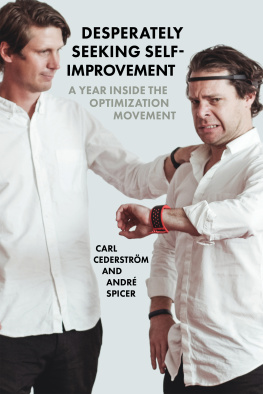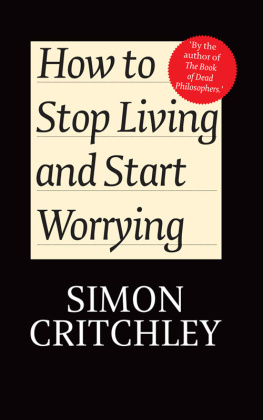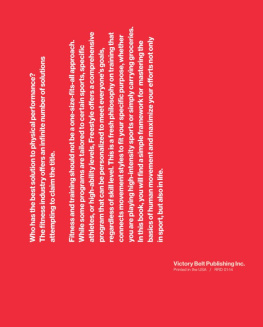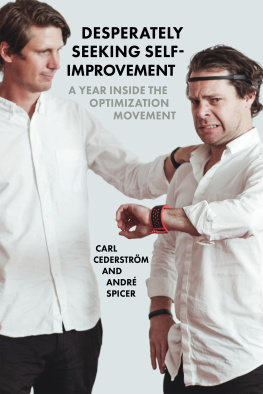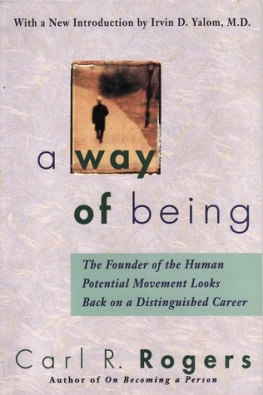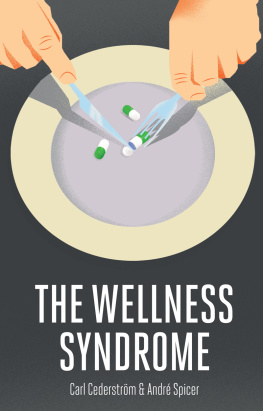


2017 Carl Cederstr m and Andr Spicer
Published for the book trade by OR Books in partnership with Counterpoint Press.
Distributed to the trade by Publishers Group West.
All rights information: rights@orbooks.com
All rights reserved. No part of this book may be reproduced or transmitted in any form or by any means, electronic or mechanical, including photocopy, recording, or any information storage retrieval system, without permission in writing from the publisher, except brief passages for review purposes.
First printing 2017
Cataloging-in-Publication data is available from the Library of Congress.
A catalog record for this book is available from the British Library.
ISBN 978-1-944869-39-7
Text design by Under|Over. Typeset by AarkMany Media, Chennai, India.
10 9 8 7 6 5 4 3 2 1
All the events described in this book are real. The names are real and so are the dates and the timeline, except in a few rare instances, where they have been changed to improve readability or preserve anonymity.

The moderator: We have Carl Cederstrm and Andr Spicer below the line with us for the next hour. I encourage readers to post their questions now .
It was the second day of January 2017, and readers were responding to an article we had just published in The Guardian about our yearlong experiment.
Emmi26: Please tell me this is a spoof.
Andr was at home in London, in front of his laptop, his newborn son sleeping next to his desk. No, this is a very serious research project , he wrote back in the comments field. Carl, sitting in his kitchen in Stockholm, tr ied to make the same point.
Almost exactly one year earlier, on January 1, 2016, we embarked on something that many Guardian readers clearly regarded as insane. We spent one year testing everything that the self-improvement industry had to offer with the plan to write it up in a book: a book which you now hold in your hands. In pursuit of a coherent structure for the project, we agreed on twelve areas of self-improvement, one for each month of the year. We began, in January, with productivity. Then, in successive months, we dealt with the body, the brain, relationships, and spirituality. During the summer months we focused on sex, pleasure, and creativity. In the fall, we optimized money, morality, and attention. The final month was dedicated to meaning, in the hope that we could come to understand the deeper motivations behind this project.
Little_Red : Oh dear, it all sounds like lots of hard work.
Over the year, we spent thousands of hours and tens of thousands of dollars test-driving self-improvement techniques. We hacked our brains, used smart drugs, experimented with sex toys, and underwent plastic surgery. We talked to psychics and life-coaches, danced naked with unknown men, attended motivational seminars, participated in professional weight-lifting competitions, and submitted ourselves to therapy.
MrFlabbyBum : I am struck by the lack of an underlying and unifying principle to all this .
Which was a fair point. But then what, beyond the elusive claim to make yourself better, is the underlying principle of self-improvement? A glance at the endless stream of advice pouring out each year reveals that this $10 billion industry is by no means unified. If anything, it is confusing and conflicted. We decided this was something we were happy to mirror in our own book. For each month, we set new goals. These could either be concrete and measurable, like memorizing 1,000 digits of pi, or abstract and elusive, like having a spiritual experience. To achieve our goals, we tried out a dizzying array of methods, from mindfulness apps to the Master Cleanse. We selected these methods because they were popular, not because they were scientifically credible.
It was the Stoic philosopher Epictetus , more than two millennia ago, who first insisted that opinions matter more than real events. Since then, advice on how to live our lives has poured out in a steady torrent . And why not? Who doesnt want a better life? In some ways self-improvement is like drinking: it is a perfect consolation in bad times. And a great companion to good times .
Take the commercial boom of self-improvement in the 1930s. It is no coincidence that it emerged in the wake of the Great Depression in the United States. In Think and Grow Rich , from 1937, Napoleon Hill offered a calming theory, saying the Depression was merely an effect of peoples fears and opinions. Dale Carnegies How to Win Friends and Influence People , from the year before, offered similarly hopeful advice: smile. It would seem that, in a time of economic and social depression, when people had nothing to rely on except themselves, self-improvement was an attractive proposition .
But self-improvement was no less popular in the more prosperous 1970s. After three decades of economic growth, large portions of the American population had been liberated from poverty. Never before had so many enjoyed so much money and so much freedom. But instead of using these riches to improve society, as Tom Wolfe observed in a classic essay from 1976, they spent it on improving themselves, plunging straight toward what has become the alchemical dream of the Me Decade. Millions flocked to self-improvement seminars. Between 1971 and 1984, 700,000 people underwent three days of EST (Erhard Seminar Training), where they learned to put themselves first, recognize that they were fully responsible for their own fates, understand that there were no victims in the world, and realize that they created their own reality.
Self-improvement today is so integrated into our society that it is hard to know where it begins and ends. Yoga is taught at elementary schools. Mindfulness is used in prisons. Life-coaching is promoted as a way of combating poverty. And self-help has now moved into the White House: Donald Trumps first marriage was officiated by Norman Vincent Peale, the father of positive thinking.
Times change, and self-improvement trends change along with them. The old gurus have been replaced by new ones like Tony Robbins and Tim Ferriss . Old trends like aerobics and faking it until you make it have been replaced by CrossFit and life-logging. The only constant is the promise that you can change your life. All we need to do is to stop worrying and start believing in ourselves, without being concerned too much about modesty. As true now as it was then, stories of transformation require no subtlety. While Napoleon Hill bragged about miraculously curing his sons muteness through thought-power, todays self-help gurus boast about their achievements, whether theyre learning new languages, warding off disease by taking ice baths, mastering new martial arts techniques, or making a fortune investing in Silicon Valley start-ups.
Meanwhile, comments kept pouring in from Guardian readers.
Lordbadger: It seems to me you tried a bunch of things for at most a month, when any one of these are things that people can spend a lifetime trying to master.
We received this comment more than once. Some people might spend a lifetime mastering one thing, whether its becoming more productive or getting the perfect body, but most people spend their lives hopping from one technique to the next, failing to master anything. The only reasonable explanation for why self-improvement continues to grow year after year is that people restlessly keep trying new advice, irrespective of whether their previous attempts have worked. If you browse through the self-help section in a bookshop, you will find guidance on everything from improving your relationship and sex life to becoming smarter and more muscular. And they often promise quick results, whether in two weeks or twenty-four hours.
Next page
